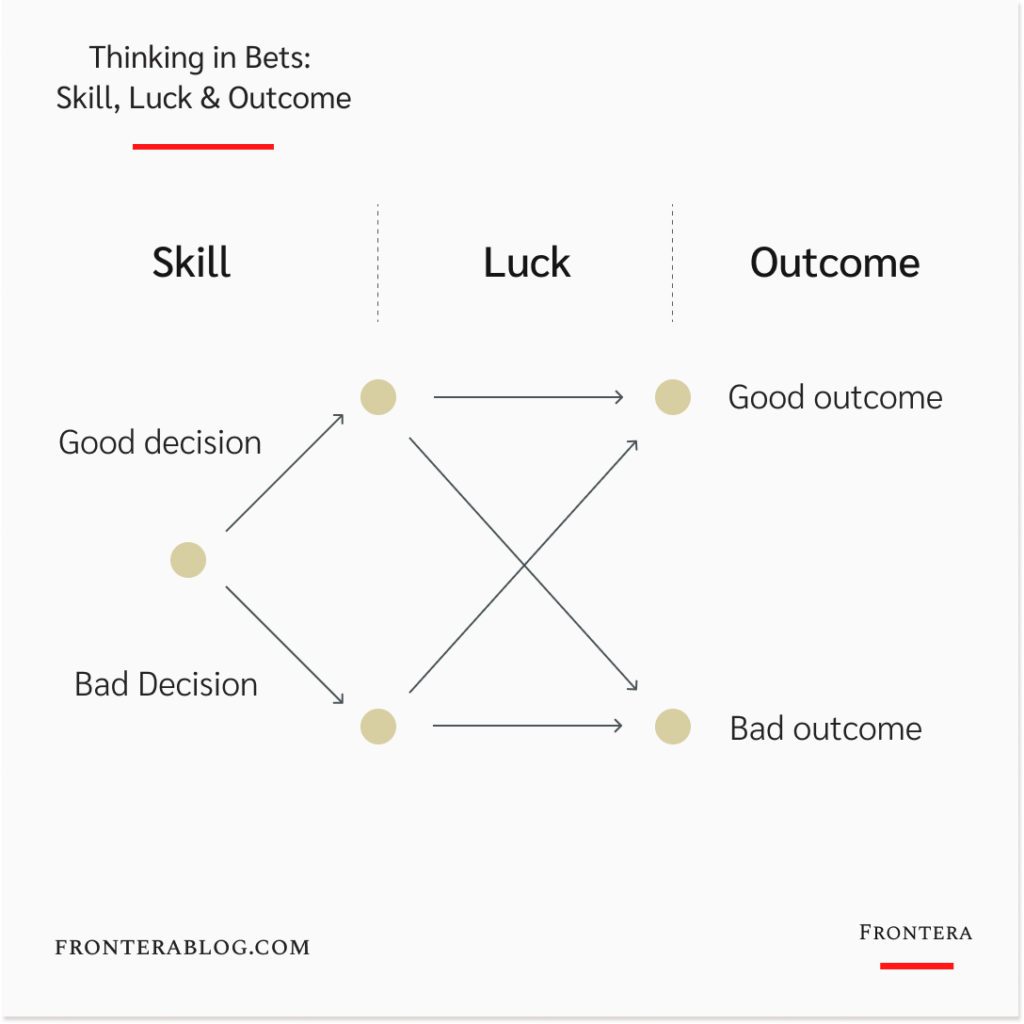Thinking in bets is a decision-making framework developed by former professional poker player Annie Duke.
In this article, you’ll find two real-life examples of how people —mistakenly— evaluate decisions based on their outcomes. Then, you’ll see why it’s wrong and how to take luck into consideration by thinking like a poker player.
Bad decision, good luck
Mike was excited when he heard about a new cryptocurrency from his close friend.
Everybody was talking about its growth potential on Reddit.
He thought he was finally early enough to get huge returns in a short time.
And he was so convinced; that he invested all his savings in it.
After two weeks, his dreams came true.
His investment got 10x higher and he cashed out.
Mike told himself: “That was the best decision of my life.“
Good decision, bad luck
Jane was working in the Marketing department of a consumer goods company.
One day, she received a job offer from the tech industry.
The offer was good: a promotion, stock options, and leading a team…
After thinking about it for a week, she decided to take the offer.
It was a great opportunity and the tech industry was better for her future.
But 5 months later, a recession started.
The tech industry was hit hard, and stocks plummeted. Her new company decided to go through a restructuring and let her go.
As she was new, she got almost no severance. And finding a new job was impossible during a recession.
Jane told herself: “That was the worst decision of my life.“
Thinking like a poker player
Life is a decision-making game.
Investments, what projects to work on, career changes…
The better decisions you make over the long term, the more successful you get.
But people make one common mistake while assessing their decisions.
They judge the quality of the decisions based on the outcomes. And this is a flaw that creates a dangerous illusion for future decisions.
Because life is not chess. It’s poker.
Luck plays a bigger role than you think.

Mike made a terrible decision by risking all his savings, but he got lucky.
Jane made a good decision by taking an opportunity with better conditions, but luck was not on her side.
Thinking in bets allows you to take luck (and probabilities) into consideration and makes you a better decision-maker in the game of life.
How to think in bets in three steps:
1. Imagine a bet with a friend
Let’s say you want to buy real estate. You expect to get a good return in three years.
Imagine a friend betting against your prediction: “Wanna bet?“
This will make you think about what your friend might know that you’re missing.
So you can find the blind spots in your thinking before you make the decision.
2. Calculate the expected value
Professional poker players decide to bet (or not) on a hand by calculating the expected value of the bet.
Let’s say there is $300 in the pot — that’s the total money you can earn.
You need $50 to call your opponent’s bet and you estimate a 25% chance of having the winning hand.
So the expected value of that bet would be 25% of the $300, which is $75.
Since the expected value ($75) is higher than the bet ($50), it makes sense to bet 50 bucks for that hand.
Do the same for your life decisions.
Compare the expected value and your “bet” by estimating:
- The potential reward of the decision — not only monetary but also joy, freedom, or time
- Probability of getting it — you cannot know the exact probability, but estimate it the best way you can (remember the bet with a friend)
- The resources (time/effort/money) to bet to get the reward — also consider the opportunity cost
If the expected value is higher than your bet, it’s a good decision. This will also help you to overcome loss aversion.
3. Analyze your past decisions
Another way to make better decisions is to examine your past choices.
But remember, regardless of the outcome.
What made you win big in that investment? Your good decision or luck?
Was starting that business a good decision despite the failure?
If you don’t find your mistakes, you run the risk of repeating them.
There are exactly two things that determine how our lives turn out: the quality of our decisions and luck. Learning to recognize the difference between the two is what thinking in bets is all about.
Annie Duke
Enjoyed this article?
Then you’ll love the How Brands Win Newsletter.
Get the “7 Positioning Sins That Cost B2B Brands Millions” guide when you join. It’s free.
References: Thinking in Bets, Annie Duke.
